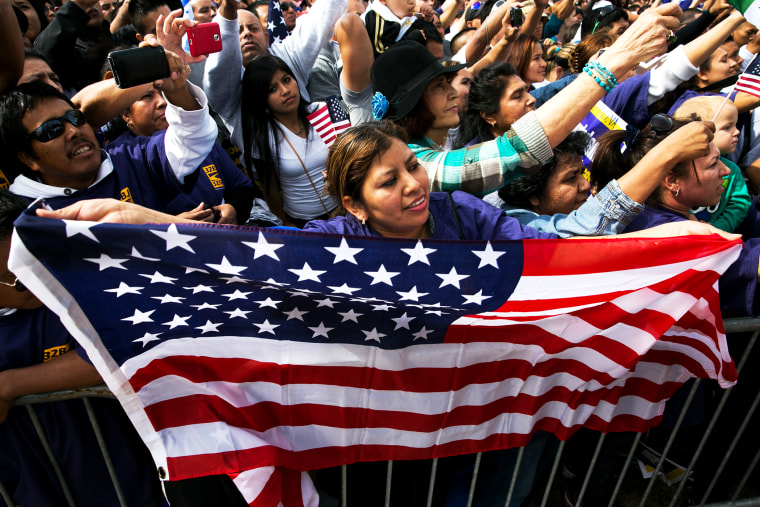If you were a Mexican-American with a cavity in 1950s Texas, you hoped the dentist had a chair for Mexicans. Otherwise, you’d either have to suffer through it or travel to a town that did.
After Reconstruction, non-whites were relegated to separate and unequal facilities. African-Americans were the target of discrimination in every facet of life. But discrimination also extended to Mexican-Americans south of the Mason-Dixon Line.
It was in this context that President Lyndon B. Johnson ultimately took up the fight for civil rights. Johnson’s first job out of college was as a teacher at a Mexican School in Cotulla, Texas, one of the many segregated schools throughout the Southwest. His experience in Cotulla with the scourge of discrimination was personal, profoundly shaping his policy outlook and agenda as president.
"They knew even in their youth the pain of prejudice. They never seemed to know why people disliked them. But they knew it was so, because I saw it in their eyes ... Somehow you never forget what poverty and hatred can do when you see its scars on the hopeful face of a young child ... It never even occurred to me in my fondest dreams that I might have the chance to help the sons and daughters of those students and to help people like them all over this country. But now I do have that chance -- and I’ll let you in on a secret -- I mean to use it."
This week, the LBJ Presidential Library commemorates the 50th anniversary of President Johnson signing the 1964 Civil Rights Act. President Obama along with four past presidents and a host of civil rights leaders will come together to celebrate one of the most important moments in our history as a nation.
It was not until the passage of the 1964 Civil Rights Act that African-Americans, Latinos and other disadvantaged groups gained the rights afforded to them by our Constitution.
The most immediate effect of the Civil Rights Act was the disappearance of segregated facilities. No longer could establishments serve “whites only,” or require blacks and Mexican-Americans to use separate bathrooms from whites.
The Civil Rights Act also allowed for the political incorporation of minorities. Because of the Civil Rights and Voting Rights Acts, minorities gained a political voice at the ballot box and as elected officials.
For example, prior to 1965, black turnout in Mississippi was less than 5%; today it is upwards of 80%. In 1963, only two Latinos served in Congress; today a record 31 Latinos serve.
The 50th anniversary of the Civil Rights Act is a time for celebration. Yet it is also a time for reflection. Old civil rights challenges have taken new forms, while completely new obstacles have arisen. And Latinos -- now the largest minority group in the country -- are at the intersection of those old and new challenges.
Latinos, like African-Americans, are once again seeing challenges to the franchise of voting. President Johnson’s home state of Texas has become ground zero for implementing time-tested measures to restrict voting rights. Prior to 1965, in Texas and the rest of the South, political participation was suppressed by a variety of tactics, foremost among them the poll tax.
Fifty years after these obstacles were done away with, they are creeping back in. In 2011, the Texas Legislature passed a bill mandating that voters present a current state-issued voter identification card. On the face of it, the bill did not seem like a challenge to civil rights. But the devil was in the details: indirect fees, coupled with the logistical difficulty of attaining an ID, place an undue burden on poorer communities.
The Department of Justice blocked the Texas voter ID law under Section 4 of the Voting Rights Act, which allowed the federal government to block discriminatory legislation in jurisdictions with a history of voter suppression. However, last year, the Supreme Court struck down that portion of the Act, freeing states like Texas to place new restrictions on voting. As the largest and most economically-disadvantaged group in Texas, Latinos are the most likely to be affected by new voter ID laws.
The current voter ID battles are old wine in new bottles.
In contrast to the decades-old struggle to combat poll taxes, a totally new civil rights challenge has arisen in the last couple years: anti-immigrant laws.
In 2010, Arizona passed SB 1070. Although the stated purpose of the law was to combat illegal immigration, the effect has been to infringe on the rights of Latinos. The “show me your papers” provision obligating local law enforcement to check the immigration status of anyone they suspect of being in the country illegally provides a shortcut to racial profiling. More worryingly, the “show me your papers” provision was upheld by the Supreme Court in 2012.
Such anti-immigrant legislation, Martin Luther King III has noted, “invokes inhumanity reminiscent of the Jim Crow South. And the police state it has created is equally cruel.”
The discriminatory intent toward Latinos is thinly veiled, if veiled at all. More generally, anti-immigrant laws diminish the value of our civil rights and respect for our liberties.
Voting rights and immigration are just two of the civil rights challenges this country must continue to address. Nevertheless, as a nation we have come a long way toward making the United States a more perfect union. In just 50 years, millions of people have gained rights that were once violently denied. The anniversary of the Civil Rights Act is a time for celebration.
At the same time, this commemoration is a moment for reflection and a renewed call to action. With our nation facing both new and familiar challenges, the LBJ Civil Rights Summit provides an opportunity to consider how the legacy of President Johnson and other civil rights leaders continue to apply today.
